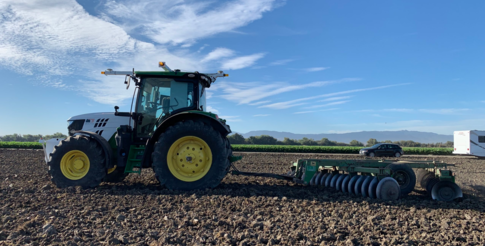Farmers need practical innovation, not moonshots, to stave off global food crisis | World Economic Forum

We are firmly entering a new era of the humanitarian and environmental crisis centred around food and agriculture. Without sustainable systems that make global production more efficient, the divide between those who have enough food and those who don’t will continue to grow. Farmers shoulder the most direct burden of preventing this. Yet around the world, they are plagued by emerging threats to their crops’ health and the health of their businesses.
To adapt, growers need tools that help them predict, respond to and mitigate climate change’s impacts on their acres. Tools that offer immediate insights into how agricultural practices affect crops’ health are one piece of the puzzle. For example, Yard Stick has developed a handheld device to help farmers quickly map and measure soil carbon levels across their fields. In addition to the climate benefits of soil carbon sequestration, soil carbon is important because it gives soil structure, stores water and nutrients that plants need, and feeds vital organisms. Making information about it accessible helps farmers understand evolving soil conditions and in turn make more informed decisions to keep their crops healthy.
In contrast, buzzy approaches like vertical farming – which promises to keep crops healthy by removing them from severe weather altogether – remain out of reach for most growers and are still far from the scale required to produce sufficient food over the next few decades.
Labour shortages and time-intensive manual tasks can make that more difficult amid declining margins, but technology can help. Farming has always been a STEM profession, and today’s growers are tech-savvy. But tech needs to fit in with their existing operations and cropping systems – not the other way around – and to build upon what farmers are already using.
Technologies that offer growers deeper insights on their crops can also make a difference by giving them data to alter their practices in an impactful way. Bengaluru-based CropIn has developed AI tools to give farmers data that helps them maximize yield and adopt more sustainable practices. These kinds of solutions offer a replicable model to empower growers worldwide.
The power of cross-industry innovation to solve pressing problems is clear. The rapid creation of safe, effective COVID-19 vaccines over the last year is just one example. Looking forward, the agricultural industry can draw on proven innovation in other industries to quickly develop new practical tools for farmers – reinvigorating stagnant pipelines with less risk and faster outcomes.
The healthcare industry is one example. Advances in human medicine can have direct relevance to plant health. In the last few decades, pharma has leaped ahead in the drug discovery process by using a toolkit of emerging technologies. This has improved disease treatment by making it highly targeted. For example, where cancer drugs once destroyed everything in their path – the harmful and the helpful – they now target specific cells and leave the rest to do their jobs.
Two billion people in the world currently suffer from malnutrition and according to some estimates, we need 60% more food to feed the global population by 2050. Yet the agricultural sector is ill-equipped to meet this demand: 700 million of its workers currently live in poverty, and it is already responsible for 70% of the world’s water consumption and 30% of global greenhouse gas emissions.
With research, increasing investments in new agriculture technologies and the integration of local and regional initiatives aimed at enhancing food security, the platform is working with over 50 partner institutions and 1,000 leaders around the world to leverage emerging technologies to make our food systems more sustainable, inclusive and efficient.
